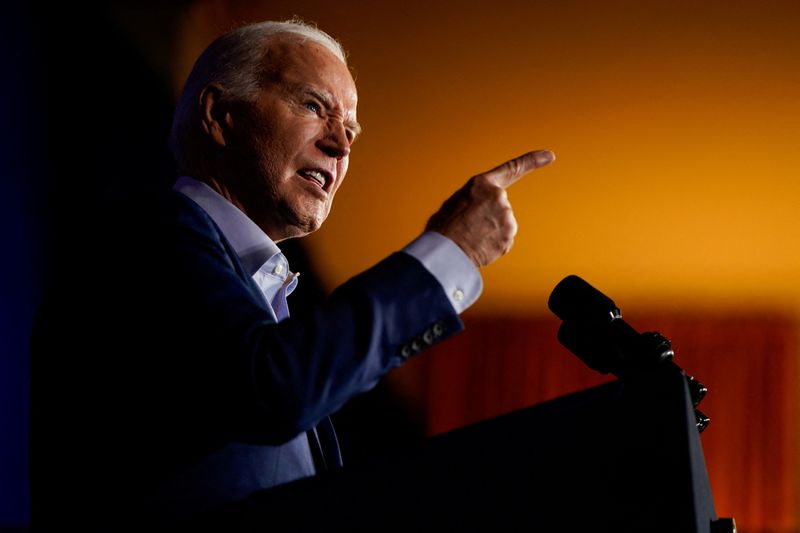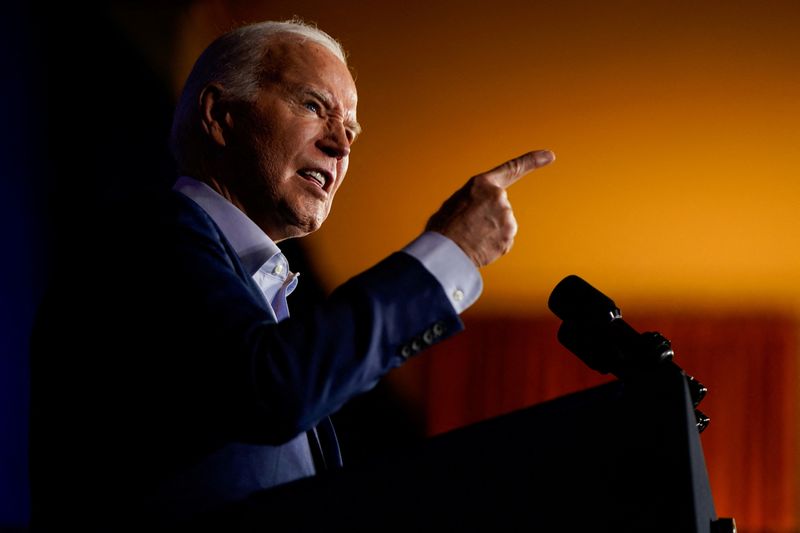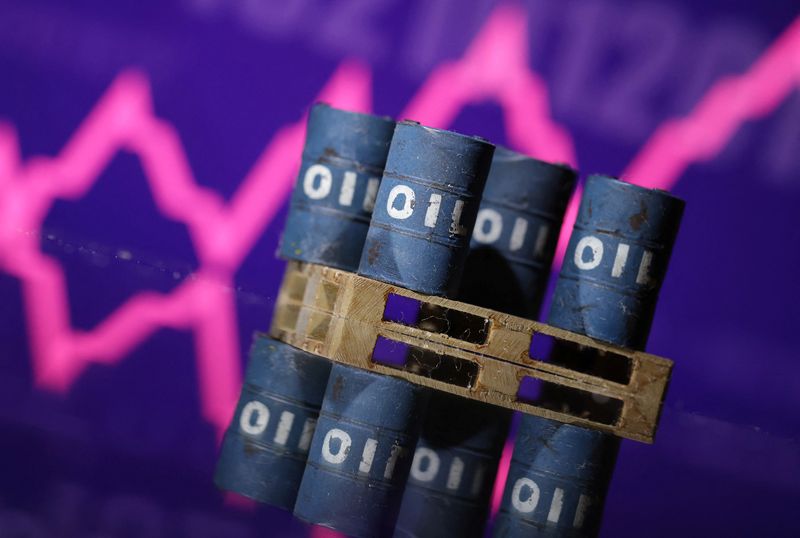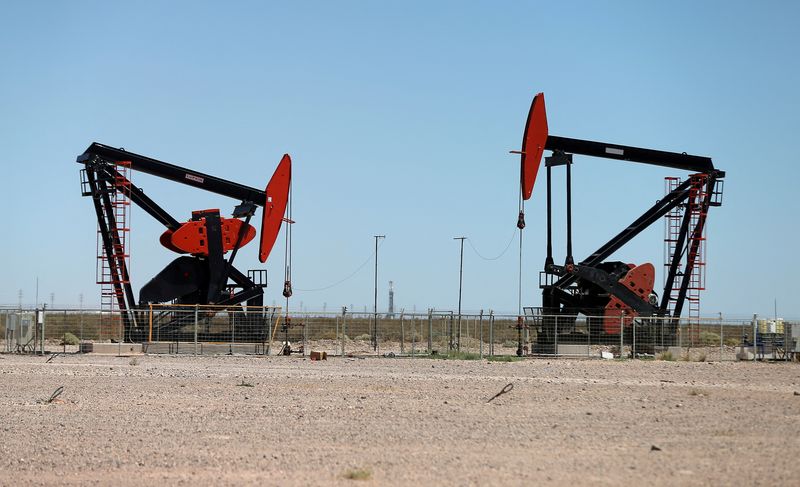Commodities
Biden to call for higher tariffs on Chinese metals in ‘Steel City’ Pittsburgh

By Trevor Hunnicutt and David Lawder
WASHINGTON (Reuters) -U.S. President Joe Biden will call on Wednesday for sharply higher tariffs on Chinese metal products as part of a package of policies aimed at pleasing steelworkers in the swing state of Pennsylvania, at the risk of angering Beijing.
In campaign stops in the “Steel City” of Pittsburgh, Biden is expected to propose raising to 25% the tariffs imposed by his predecessor Donald Trump on Chinese steel and aluminum products, according to an administration official.
The products targeted currently face up to a 7.5% levy under a Trump-era policy under Section 301 of the U.S. trade law, under a review Biden ordered in 2022.
The Biden administration is also pressuring neighboring Mexico to prohibit China from selling its metal products to the United States indirectly from there.
At the same time, it is launching an investigation into Chinese trade practices across the shipbuilding, maritime and logistics sectors, which could lead to more tariffs.
The measures, set to be unveiled as Biden visits the headquarters of the United Steelworkers union, will invite blowback from China at a time of already heightened tensions between the world’s two biggest economies.
Trump’s imposition of tariffs during his 2017-2021 presidency prompted China’s retaliation with its own levies.
Pennsylvania is one of a half-dozen battleground states likely to decide the November election rematch between Biden and Trump. The economy ranks among voters’ top concerns.
Jared Bernstein, director of the White House Council of Economic Advisers, said on Wednesday the “targeted intervention” being considered by the Biden administration should not worsen persistently high inflation.
“If we don’t take action, we’re putting at risk about one of our most critical sectors – what the president calls the backbone of the American economy, the bedrock of our national security – and that’s domestic steel production,” he told CNBC.
KEY VOTING BLOC
Biden and his Republican opponent have each courted union leaders and blue-collar workers in faded industrial hubs who comprise a significant voting bloc in Pennsylvania and Michigan, another swing state.
The steelworkers union, which sought the measures Biden is now adopting, endorsed him last month.
Biden handed the union another win when he came out last month against a proposed $14.9 billion bid by Japan’s Nippon Steel to buy U.S. Steel Corp.
Both 2024 candidates have sharply departed from the pro-trade consensus that once reigned in Washington, capped by China’s joining the World Trade Organization in 2001.
Trump, who withdrew from the would-be Trans-Pacific Partnership trade deal in 2017, has proposed a 10% tariff on all imports if he returns to office.
China was the seventh-largest exporter of steel to the U.S. in 2023, with shipments of 598,000 net tons, down 8.2% from 2022, according to U.S. Census Bureau data compiled by the American Iron and Steel Institute, an industry trade group.
Canada was the top exporter to the U.S., with 6.9 million tons, followed by Mexico, with 4.2 million tons.
Domestic steelmakers shipped 89.3 million net tons of steel in 2023, according to AISI data.
Any new levies on steel and aluminum would be subject to the approval of Biden’s appointed trade representative, Katherine Tai, at the completion of the review of the Trump-era tariffs.
The new levies would come on top of 25% Section 232 national security tariffs also imposed by Trump on steel and aluminum products and product-specific anti-dumping and anti-subsidy duties that often reach into the triple-digit percentages.
China’s economy grew by a faster-than-expected 5.3% in the first quarter, data showed on Tuesday, as the country has turned to exports to shore up growth in the face of protracted weakness in the property sector and mounting local government debt. Beijing regards Trump-era tariffs as discriminatory.
Officials said they expected Chinese exports to start flooding global markets, concerns raised by Biden Treasury Secretary Janet Yellen on a trip to the country last week.

China exported 25.8 million tons of steel products in the first quarter, the highest for the period since 2016 and a rise of 30.7% year on year, Chinese customs data showed.
“China cannot export its way to recovery,” Biden’s top economic policymaker, Lael Brainard, told reporters.
Commodities
Oil prices slide on Middle East peace talks; Fed decision awaited

Investing.com–Oil prices drifted lower Monday as peace talks between Israel and militant group Hamas in Cairo tempered fears of a wider conflict in the Middle East disrupting supplies, but losses were limited by caution ahead of the latest Federal Reserve meeting.
At 08:25 ET (12:25 GMT), fell 0.6% to $87.69 a barrel, while fell 0.7% to $83.25 a barrel.
Middle East peace talks
A Hamas delegation will visit Cairo on Monday for talks aimed at securing a ceasefire, a Hamas official told Reuters on Sunday, with the group expected to respond to Israel’s latest Gaza phased truce proposal delivered on Saturday.
Concerns that the conflict between Hamas and Israel would balloon into a wider war in the oil-rich region prompted sharp gains earlier this month, as traders worried that this could result in a big hit to supplies from the region.
US rate fears grow on sticky inflation, Fed anticipation
Markets further dialed back bets on early interest rate cuts by the Federal Reserve after data- the Fed’s preferred inflation gauge- read hotter than expected for March.
Fears of higher-for-longer U.S. interest rates factored into concerns that oil demand will weaken later this year, especially as economic growth weakens. This notion was furthered by weaker-than-expected U.S. growth data last week.
Strength in the , following the inflation data, also pressured crude prices.
The focus is now squarely on a meeting later this week, where the central bank is widely expected to keep rates steady and offer hawkish signals on monetary policy.
remove ads
.
Beyond the Fed, more economic cues were also in focus this week for oil markets. data from top importer China is due later in the week, and is expected to offer more insight into an ongoing economic recovery in the country.
Geopolitical tensions, tight supply bets persist
The specter of geopolitical tensions and potential supply risks in oil markets still remained in play.
Ukraine attacked more Russian oil refineries over the weekend, while also calling on more military aid from the U.S. over worsening conditions on the front lines.
Attacks on Russian refineries factored into bets on tighter supplies, especially as Russia announced more production and export cuts earlier this year.
(Ambar Warrick contributed to this article.)
Commodities
Oil dips on Israel-Hamas peace talks, slim near-term US rate cut hopes

By Deep Kaushik Vakil
(Reuters) -Oil prices dipped on Monday as Israel-Hamas ceasefire talks in Cairo tempered fears of a wider Middle East conflict, while U.S. inflation data dimmed the prospect of interest rate cuts soon.
futures for June, which expire on Tuesday, were down by 70 cents, or 0.8%, to $88.80 a barrel by 1245 GMT. The more active July contract fell 52 cents, or 0.6%, to $87.69 a barrel.
U.S. West Texas Intermediate (WTI) futures were down 58 cents, or 0.7%, at $83.27 a barrel.
Israeli airstrikes killed at least 25 Palestinians and wounded many others on Monday, as Hamas leaders arrived in Cairo for a new round of talks with Egyptian and Qatari mediators.
Egypt is hopeful but waiting for a response on the plan from Israel and Hamas, Egyptian Foreign Minister Sameh Shoukry said.
“With little other fresh news, the possible cooling of the Gaza environment sees oil prices slip,” said John Evans of oil broker PVM.
Markets were also on watch for the U.S. Federal Reserve’s May 1 monetary policy review.
“The language and forward forecasts will be pored over by all market participants,” PVM’s Evans said.
Investors are cautiously pricing a higher probability that the Fed could hike interest rates by a quarter percentage point this year and next as inflation and the labor market remain resilient.
U.S. monthly inflation rose moderately in March, putting a damper on expectations of rate cuts in the near future. Lower inflation would have increased the likelihood of interest rate cuts, which tend to stimulate economic growth and oil demand.
remove ads
.
“The sticky U.S. inflation sparks concerns for ‘higher-for-longer’ interest rates”, leading to a stronger U.S. dollar and putting pressure on commodity prices, independent market analyst Tina Teng said.
A stronger dollar makes oil more expensive for those holding other currencies.
By contrast, an early look at April inflation data from the euro zone, from Spain and Germany, offers a mixed picture for the European Central Bank, but looks unlikely to derail a June rate cut.
Inflation data from the wider euro zone is to be released on Tuesday.
Commodities
Oil settles higher on supply concerns in the Mideast, economic woes subdue gains

By Georgina McCartney
HOUSTON (Reuters) -Oil prices settled higher on Friday, garnering support from tensions in the Middle East, but a strong dollar and U.S. inflation data quashed hopes that the Federal Reserve would cut interest rates soon, giving prices a ceiling.
futures settled up 49 cents, or 0.55%, to $89.50 a barrel. U.S. West Texas Intermediate crude futures settled up 28 cents, or 0.34%, to $83.85 a barrel.
Supply concerns supported prices as tensions continue in the Middle East.
Benjamin Netanyahu, Israel’s prime minister, said any rulings by the International Criminal Court, which is investigating Hamas’ Oct. 7 attacks on Israel and Israel’s military assault on Gaza, would not affect Israel’s actions but would “set a dangerous precedent.”
As tensions escalate, Israel’s military said on Friday that its air force struck in Lebanon’s West Beqaa District and killed a militant who advanced attacks against Israel.
Israel stepped up air strikes on Rafah on Thursday after saying it would evacuate civilians from city in southern Gaza and launch an all-out assault despite allies’ warnings that doing so could cause mass casualties.
“Israel is not afraid to come and support themselves on their own if they have to, people are watching to see what happens between Netanyahu and Biden,” said Tim Snyder, chief economist at Matador Economics.
“The geopolitical element is not over, the proxy battles going on right now will continue,” and this is still providing support and helping to offset the negative pressure from the inflationary data, Snyder added.
remove ads
.
Meanwhile, macroeconomic pressures capped gains after data released on Friday showed growing inflation.
In the 12 months through March, U.S. inflation rose 2.7% after an advance of 2.5% in February. Last month’s increase was broadly in line with economists’ expectations.
The Fed has a 2% inflation target. The U.S. central bank is expected to leave rates unchanged at its policy meeting next week.
“The economic data this morning was enough for market participants to conclude that the Fed is not going to be forthcoming with interest rate cuts any time soon,” said John Kilduff, partner with Again Capital LLC.
“Geopolitical jitters in the market are what is keeping us aloft. Those two competing forces should keep us in check,” Kilduff added.
U.S. Treasury Secretary Janet Yellen told Reuters on Thursday that U.S. GDP growth for the first quarter could be revised higher, and inflation will ease after a clutch of “peculiar” factors held the economy to its weakest showing in nearly two years.
U.S. economic growth was likely stronger than suggested by the weaker quarterly data, Yellen said. Oil prices have flip-flopped since Yellen’s comments and the release of the inflation data on Friday.
Meanwhile, the dollar soared to a fresh 34-year high against the yen on Friday, bolstered in part by the U.S. inflation data.
“Dollar strength is helping to exert negative pressure today,” Kilduff said.
Elsewhere, OPEC Secretary General Haitham Al Ghais said in an op-ed article that the end of oil is not in sight, as the pace of energy demand growth means that alternatives cannot replace it at the needed scale, and the focus should be on cutting emissions not oil use.
remove ads
.

 Forex2 years ago
Forex2 years agoForex Today: the dollar is gaining strength amid gloomy sentiment at the start of the Fed’s week

 Forex2 years ago
Forex2 years agoHow is the Australian dollar doing today?

 Forex1 year ago
Forex1 year agoUnbiased review of Pocket Option broker

 Forex2 years ago
Forex2 years agoDollar to pound sterling exchange rate today: Pound plummeted to its lowest since 1985

 Cryptocurrency2 years ago
Cryptocurrency2 years agoWhat happened in the crypto market – current events today

 World2 years ago
World2 years agoWhy are modern video games an art form?

 Stock Markets2 years ago
Stock Markets2 years agoMorgan Stanley: bear market rally to continue

 Economy2 years ago
Economy2 years agoCrude oil tankers double in price due to EU anti-Russian sanctions

































